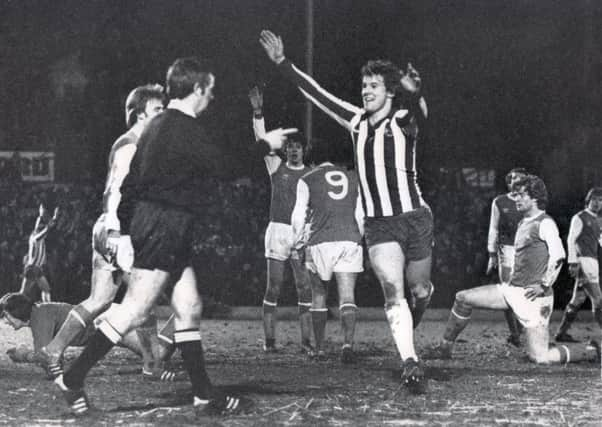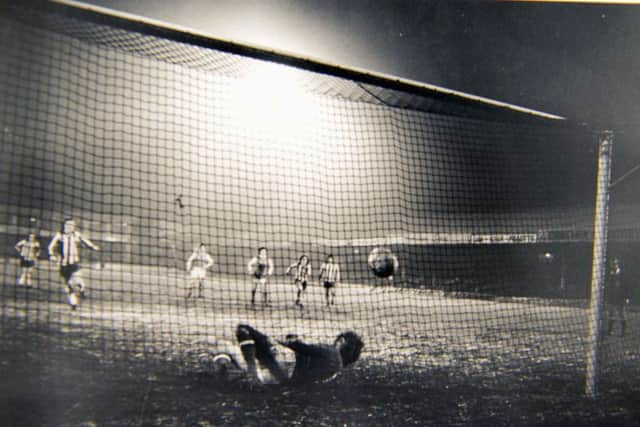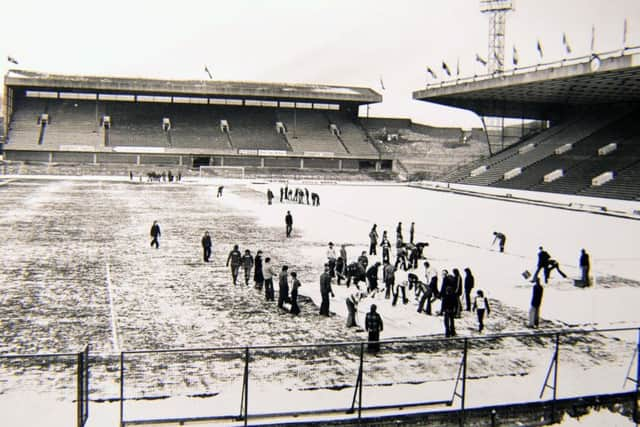Flashback: Rodger Wylde and Mark Smith recall Sheffield Wednesday's FA Cup marathon with Arsenal


But 40 years ago this month a record-breaking FA Cup marathon led to the Owls playing a lung-bursting 16 hours of knockout football only to bow out of the competition before the end of January.
“I played nine times in the Cup that season,” says the 64-year-old with a smile. “Many players who win the FA Cup play less games than that and yet I only reached the third round.”
Advertisement
Hide AdAdvertisement
Hide AdOne of the most memorable tussles in the history of the world’s oldest Cup competition was behind the extended exertions of Wylde and his team-mates during what became the winter of discontent.


Replays piled up higher for Wednesday than rubbish in the streets amid widespread strikes as an extra game was needed to dispose of both Scunthorpe United and Tranmere Rovers in the first two rounds before the club landed a plum home draw against Arsenal.
Terry Neill’s Gunners, beaten by Ipswich Town in the previous season’s final, were sitting fourth in the old First Division and not expected to be given too many problems at Hillsborough by a host side languishing in the lower reaches of the third tier.
The reality, however, was rather different with Jack Charlton’s Owls taking the Londoners to four replays in a punishing 17-day period that saw almost 145,000 fans pour through the turnstiles despite the final three meetings all taking place in Leicester.
Advertisement
Hide AdAdvertisement
Hide AdMark Smith, then just 18, remembers the tussles well. “There was a lot of snow around and most of the third round ties were off,” the former defender told The Yorkshire Post.


“But the club and Jack were desperate to get ours on at Hillsborough. Whether that was because a big crowd was expected and we needed the money, I don’t know.
“Nowadays, there is no way it would be played. We couldn’t wear studs or rubbers, so ended up with these cork studs that you could kick off to reveal three pins. Again, it would not happen today.
“The conditions were a big leveller. What really stands out in my mind, though, is how the second half was held up because the fans on the Kop were bombarding Pat Jennings with snowballs.
Advertisement
Hide AdAdvertisement
Hide Ad“Jack walked over to ask them to stop but they just threw more at him. I was only 18 so was not allowed to laugh.”
Such was the cachet of the Cup back then that a bumper Hillsborough crowd of 33,635 – more than three times the league average of 10,860 that season – saw Jeff Johnson’s diving header cancel out Alan Sunderland’s opener.
Three days later, the two teams met again at Highbury with the prize now on offer a fourth round tie against either Notts County or Reading. Wylde put the visitors in front and a shock seemed on.
“It was my first visit to Highbury,” recalls Wylde, who spent nine years with the Owls after joining as an apprentice in 1971. “A lovely stadium, with the very best facilities including under-floor heating.
Advertisement
Hide AdAdvertisement
Hide Ad“I scored just before half-time and the thing I remember is Arsenal getting a corner in the very last minute. We were still 1-0 ahead and David O’Leary said to me, ‘Well, Rodger you have deserved to go through so well done’.
“Unfortunately, the corner was headed out to Liam Brady and he fired in from the edge of the area. We were devastated.”
Extra-time could not separate the two teams, meaning a second replay was required. Charlton turned down the offer of tossing a coin for home advantage and instead opted for a neutral venue.
Filbert Street got the nod, mainly because Leicester had use of a balloon that could be spread over the pitch and hot air pumped underneath.
Advertisement
Hide AdAdvertisement
Hide Ad“I don’t want to take the risk of playing them at their place,” explained the Owls chief. “We will take 20,000 supporters down the motorway and the locals will support the underdogs. We can take Arsenal.”
Charlton’s bold prediction did not quite come true. But Arsenal did need all three replays staged at Filbert Street to finally see off a side whose Third Division campaign had effectively been put on hold.
“We were due to play Southend on the Saturday after the first replay and stayed down south but the game was called off,” recalls Smith. “The thing that sticks out in my mind from that trip is a three-quarters sheepskin coat that I bought. A real Starsky and Hutch number. It looked fine down south but wasn’t really the thing to be seen in back home in Sheffield. So, it went in the wardrobe and never came out again.”
Smith, sans new coat, helped the Owls to 2-2 and 3-3 draws before first-half goals from Steve Gatting and Frank Stapleton eventually sent the Gunners through after five gruelling ties, the most between two League clubs. Only the qualifying round tussle between Alvechurch and Oxford City in 1971-72 lasted longer than Wednesday’s 1979 epic.
Advertisement
Hide AdAdvertisement
Hide Ad“Arsenal were on £250 per man appearance money to go through,” recalls Wylde. “We were also on a bonus but only if we got through – which obviously we didn’t manage to do.
“The five games against Arsenal had been watched by huge crowds and yet we weren’t due to get a penny.
“To their credit, the club did get us all together and handed us £125 in cash as a bonus. They also said we were going away for a warm-weather training camp to Guernsey.
“I can’t say the lads were overly thrilled when we heard about that but, in the end, we had a great time. It was party night every night.”
Advertisement
Hide AdAdvertisement
Hide AdFor Smith, the agony of defeat to Arsenal was only added to by the damaged ankle ligaments that curtailed his involvement after just 20 minutes.
“I was still living with my mum about a mile from Hillsborough,” he added. “So, after an away game, I would get dropped off before the rest of the lads carried on to the ground.
“Getting off the bus was fine, as I could use the seats to lever myself. My problem came when I got off. I had no crutches and the ground was sheet ice.
“I turned round, put my good foot down and slipped. By then the bus was long gone. I couldn’t move for 20 minutes.
Advertisement
Hide AdAdvertisement
Hide Ad“It was about half-past midnight by now and I could see one light on in the distance. So, I crawled on my hands and knees, hoping if I banged on the door there would be someone in. Thankfully, there was.
“He rang my dad, who walked down as it was so icy. He got me home, in the end. A painful end to a painful night.”